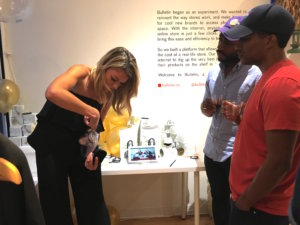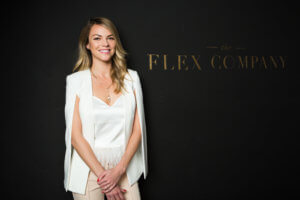For years, men have exerted control over healthcare, leaving a vast gender gap and unexplored opportunities in women’s healthcare technology. In an effort to set things right, some startups are beginning to launch products (and conversations) around the most tabooed and ignored natural cycle in women: menstruation. The Flex Company, a Venice, California-based startup, is one of them.
Starting with its menstrual disc, a single-use product, the company wants to create life-changing, body-positive experiences for women. It has raised a $3.6M seed round in October 2018 by companies like Founders Fund and Y Combinator to reach a total funding of $7.9M.
Innovation in menstrual products can be best understood by revisiting its history. While disposable menstrual pads hit the market in 1920s and tampons and menstrual cups were invented in the 1930s, period talk remained a topic of bonding between women and not a conversation en masse. A handful mentions of periods on TV and movie history appeared but what led to an increased awareness was social media. Especially when in 2015, Kiran Gandhi ran a marathon while bleeding, and Rupi Kaur posted a picture showing blood on her sweatpants on Instagram.
But the intermittent landmark moments in menstrual history hasn’t helped all women. Not all women have access to tampons or sanitary pads and therefore, menstrual equity is becoming a big issue in the U.S., with those who menstruate urging states to axe the tax on tampons. Around the developing world, 1 in 3 women lack access to basic sanitation facilities and continue to use old clothes, blankets, cotton wool, tissue, grass or even leaves during their periods, succumbing to life-threatening infections.
The Flex-ible Period
Lauren Schulte, CEO and Founder of The Flex Company, was one. She had been suffering for years from yeast infections in the vaginal tract when a nurse told her that the condition and the mounting discomfort was linked to using tampons. After trying numerous alternatives, Schulte felt the need for innovation as, she says, “no man was going to create something to solve this problem”, and the idea for Flex was born.
The Flex Company recognizes that different people have different needs when it comes to their period. A disposable sanitary pad or a tampon might best address one woman’s needs while proving utterly useless for another. Many women, for instance, find it difficult to insert or remove the tampon and also complain that there’s no way to ensure that there are no leaks. But Schulte’s story of making Flex after suffering 15 years from infections is important because it directs attention towards women’s healthcare. “Tampons—organic or inorganic—disrupt the pH of the vagina and that can lead to yeast infections or bacterial vaginosis,” she says.
A healthy vaginal pH is acidic and ranges from a pH of 3.5 to 4.5 but during menstruation, blood (neutral pH of 7.4) causes the pH to rise. While our bodies are able to handle a certain level of fluctuation, The Flex Company argues that “the period products we use to manage our flow may be counterintuitive to the menstruation process”. For example, tampons (both organic and regular) can contribute to an elevated pH since they absorb and retain the fluids that cause pH to increase.” As organic tampons are made up of cotton, they absorb the fluid and grow bacteria in the vagina whose dark, moist environment is the perfect host for it.
So if tampons play a role in elevating vaginal pH, what is the alternative? Menstrual cups or discs like Flex.

A Flex Popup Demonstrating How To Insert The Menstrual Disc
Both provide up to 12 hours of period protection and unlike tampons, they do not absorb blood but collect it. In addition, the company explains, “Menstrual discs and cups do not alter the natural environment of the vagina because they are made of inert materials (medical grade polymer) that do not absorb menses…and (therefore) do not to affect vaginal flora.”
The main difference between a cup and the Flex disc, however, is that a menstrual cup sits in the vaginal canal, “while Flex”, the website explains, “sits in the widest part of the vagina called the fornix.” This seemingly minor difference has given the company its biggest advantage over other menstrual products. As Flex keeps the vaginal canal clear, women can have penetrative sex with Flex but not with a menstrual cup.
Flex is marketing its starter kit for $15 where it ships eight discs (equal to three super tampons) to the consumer. Each disc can also be used for up to 12 hours, and unlike a cup, it has to be disposed. As Flex is made of medical grade polymer, it isn’t biodegradable, making cups the most environmentally-friendly option in the market. The company, however, defends its product by saying that it’s better than sanitary pads or tampons because fewer are needed per cycle.
Schulte calls Flex the first true innovation in period care in nearly 80 years but this innovation wasn’t easy to sell. “When I was starting out,” she says, “I really struggled explaining to men (venture capitalists) why tampons were so terrible and they would say well if they’re so bad and why does everybody use them, ignoring that there was nothing else to use.”

Flex Founder and CEO Lauren Schulte
This is despite the rising number of women as consumers. The global feminine hygiene product market size is anticipated to reach $33.78Bn by 2025 and it’s the menstrual care products segment (consisting of sanitary napkins, tampons, and menstrual cups) that continue to hold the largest market share in terms of revenue.
Flex’s competition today are the various types of menstrual cups from FemCap to Diva, Me Luna, Lunette, among others, and period panties available in the market but Schulte says, “You love menstrual cups, I think that’s amazing. We are in the business to help educate and inform consumers, not to push our product onto people.” The company also recognizes that not all women might be comfortable inserting or removing a flex disc. While some reviews complain of the disc’s dislodging at slight movement, many others have praised the product, calling it life-changing. Flex’s profit margins too as a reflection, Schulte says, are very high. In August 2017, she said that they were on a $4M run rate after only starting shipping in October 2016.
The female hygiene product market is fiercely competitive with both multinationals and young startups trying to appeal to women. But what sets a company like Flex apart is that unlike multinationals, it is not only selling an intimate product, it is also intimate with its consumers and focused on improving their product. In October 2018, for instance, the startup announced the acquisition of Keela LLC which had redesigned the 81-year-old menstrual cup by adding a patented pull string stem, making removal easier for its products and now, for Flex.
What’s most reassuring here is that, finally, with startups like The Flex Company, it’s women who are determining what the future of women’s health looks like.
Subscribe to our newsletter



